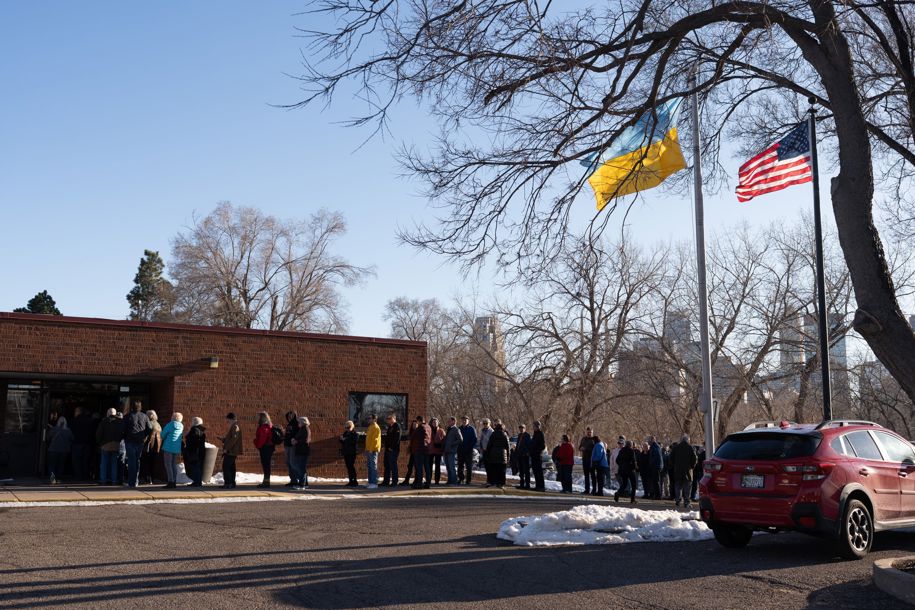
U.S. Parole Delays Leave Ukrainians at Risk of Losing Status
Prolonged delays in a key U.S. humanitarian parole program are leaving tens of thousands of Ukrainians with expiring work permits and mounting fears over detention and deportation.
Nearly 200,000 Ukrainian nationals living legally in the United States under a humanitarian parole program now risk losing their status as renewal applications stall under President Donald Trump’s immigration policies, according to internal government data reviewed by Reuters. Despite a federal court order requiring adjudications to resume, only a small share of pending cases has been processed, leaving families, workers and employers exposed to detention, deportation and sudden income losses.
What’s New and Why It Matters
The crisis began in January 2025, when the Trump administration halted both new and renewal humanitarian parole applications, citing unspecified security concerns. Although a federal judge ordered the government to restart processing in May 2025, progress has remained limited: around 1,900 renewal applications — across Ukrainians and other nationalities — have been completed, while close to 200,000 remain pending.
The widening gap between document expiration and adjudication has pushed many Ukrainian parole holders into legal limbo. Expired documents can lead to the immediate loss of work authorization, greater vulnerability to detention during routine encounters and severe financial instability for families already displaced by war.
For U.S. employers and local communities, the backlog means losing trained workers, facing service interruptions and confronting labor shortages in sectors that had come to rely on Ukrainian employees. Advocates warn that, unless processing accelerates, the parole backlog risks becoming a lasting fault line in U.S. immigration policy toward Ukrainians.
A Program Built for Protection Now Strains Under Delays
The Ukrainian humanitarian parole program was launched in April 2022 in response to Russia’s full-scale invasion, offering a temporary protection pathway for those fleeing the conflict. The program allowed beneficiaries to live and work legally in the United States for two years and became one of Washington’s central civilian protection tools.
Nearly 260,000 Ukrainians entered the United States under the initiative. Although they represent only a fraction of the more than 5.9 million Ukrainian refugees worldwide, the program has been instrumental for those who reached U.S. soil and began rebuilding their lives.
That stability is now under strain. As renewal deadlines converge with administrative delays, many parole holders report that their legal status and ability to work depend entirely on processing times they cannot predict, track or influence.
How the Backlog Developed — and Where the System Is Failing
Legal experts and immigration advocates point to a combination of policy and operational factors behind the growing backlog:
- The January 2025 halt to all new and renewal applications
- Reduced staffing and limited administrative capacity in core processing units
- Expanded security checks without accompanying increases in resources or personnel
Together, these steps have slowed adjudications to a crawl. Tens of thousands of parole holders now face expiring work permits, disrupted access to health insurance and other services, and the constant risk that a routine traffic stop or workplace inspection could trigger detention.
Advocates say the current pace of decisions is incompatible with the time-limited nature of parole documents, turning a humanitarian protection mechanism into a source of renewed uncertainty.
Human Impact: “A Hamster Wheel of Anxiety”
The personal consequences of the delays are stark. Kateryna Golizdra, 35, lost her work authorization in May. Forced to leave her management role at the Ritz-Carlton in Fort Lauderdale — where she earned more than $50,000 a year — she also lost employer-sponsored health insurance and the ability to support family members abroad.
Golizdra described the past six months as “a hamster wheel of anxiety,” unable to plan, work or predict when her renewal would be processed. Among 24 Ukrainians interviewed by Reuters, six said they felt compelled to leave the United States and return to Europe rather than risk detention after their documents expired.
Advocacy groups report increases in detentions during everyday activities such as construction shifts, ride-share driving and food deliveries. For many parole holders, the threat of a status lapse has become an immediate concern that shapes daily decisions about work, travel and medical care.
| Date | Event |
|---|---|
| April 2022 | U.S. launches Ukrainian humanitarian parole program |
| 2022–2024 | Nearly 260,000 Ukrainians enter the United States |
| January 2025 | Trump administration halts all applications and renewals |
| May 2025 | Federal court orders processing to resume |
| May–March 31 | Only around 1,900 renewal applications processed |
Political Pressure Builds in Washington
On Capitol Hill, lawmakers say they are receiving hundreds of requests for assistance from Ukrainian families facing imminent status expirations. Representative Mike Quigley (D-IL) has warned that many parole holders fear deportation if their renewals are not completed in time, calling the delays inconsistent with U.S. commitments to support Ukraine.
Legal support organizations, including the Ukraine Immigration Task Force, report weekly calls from individuals confronting expired work permits, detention risks and sudden income losses. Attorneys say the lack of clear government guidance has deepened confusion among migrants and employers alike.
The Department of Homeland Security has not publicly explained the reasons for the January halt or provided a timetable for clearing the backlog. After meeting Ukrainian President Volodymyr Zelenskiy in March, President Trump said his administration was “weighing” revoking legal status for Ukrainians — a remark that intensified anxiety among parole holders, even though no official policy change has been enacted.
Economic Fallout for Workers, Businesses and Communities
The parole program has supplied workers to industries already struggling with labor shortages, including:
- hospitality
- food service
- construction
- delivery and transportation
- health and support services
As renewals stall, employers report losing trained staff who can no longer legally work. Individuals face sudden income gaps, lapsed health insurance and an increased risk of eviction. Hospitals, restaurants, construction sites and small businesses that integrated Ukrainian workers into their operations now confront service disruptions and higher hiring costs.
Economists warn that, beyond individual hardship, the backlog threatens to weaken local labor markets and undermine sectors that depend on a predictable supply of authorized workers.
What Happens If Processing Does Not Accelerate?
If adjudications do not speed up, analysts expect several likely consequences:
- Mass job losses as work authorization documents expire
- More detentions during routine encounters
- Increased self-deportations as Ukrainians move to Europe for legal security
- Persistent labor shortages for employers reliant on parole holders
- Heightened congressional scrutiny of the administration’s handling of the program
Advocates caution that, without a coordinated response, the parole initiative could shift from a symbol of U.S. support for Ukrainian refugees to a case study in how administrative delays can erode legal protection and public trust in the immigration system.
Understanding the Crisis: Key Questions
Why did processing stall?
The Trump administration halted all humanitarian parole processing in January 2025, citing security concerns. A federal judge later ordered adjudications to resume, but progress has remained slow and the backlog continues to grow.
What risks do Ukrainians face?
When parole or work authorization expires, individuals can face detention, deportation proceedings, job loss and the loss of employer-based health insurance and other benefits.
How many people are affected?
Of the roughly 260,000 Ukrainians who entered the United States under the parole program, Reuters data indicate that around 200,000 are directly affected by stalled renewals.
What is being done to address the backlog?
Lawmakers, legal aid groups and advocacy organizations are urging the administration to accelerate processing and offer clear guidance. So far, DHS has not released a detailed plan or timeline for resolving the backlog.
What to Watch in the Coming Months
Analysts say three developments could shape the program’s future:
- Administrative acceleration, including increased staffing and streamlined security checks
- Congressional action to create temporary protections or alternative legal pathways
- Judicial oversight, including further court rulings enforcing compliance
Key signals will include any updated DHS guidance on processing times, potential legislative proposals and new court decisions. For now, nearly 200,000 Ukrainian nationals remain uncertain whether they will be allowed to work, remain with their families or plan their futures in the United States.
Source: This report is based on data, interviews and documentation published by Reuters and reviewed by Probus News. All figures, quotations and timelines originate from Reuters reporting.






